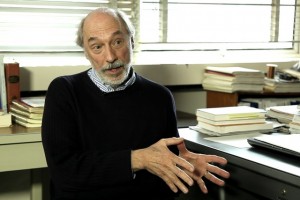The Impact of Higgs Boson Discovery
Physicist Jonathan Butterworth on the predictions of the Standard Model, new excitement about physics and futu...
How did the complexity in the Universe evolve through it’s history? What is the universal computation? What are the capabilities of the universal computer? Professor of Mechanical Engineering at MIT Seth Lloyd speaks on how computation manipulates information.
The Universe, very hot, featureless, expanding, starts to clump together, becomes less homogeneous, less regular. There is something about the laws of physics that takes something that’s regular and makes it more clumpy, more random looking, more detailed. This is actually very strange by the ordinary laws of physics. Where does that come from? It comes from a special feature about gravity, and the laws of gravitation.
Ironically we know much less about the origins of life than we know about the origins of the Universe. The Universe was born 13,76 billions years ago, Big Bang, temperature of billions of degrees; life – we don’t know. But we do know features of life now, and we can extract from these features how complexity might have evolved.
The Universe is not a computer, or is it? Actually the dynamics of the Universe support computation. The laws of physics support computation. And I know from my own research, building quantum computers, that the laws of physics support computation at the most microscopic and fundamental level, where elementary particles store bits of information: every time two particles collide, those bits flip. So the universe is full of bits of information.

Physicist Jonathan Butterworth on the predictions of the Standard Model, new excitement about physics and futu...

MIT Senior Research Scientist Frank Taylor on two types of current interactions, experiments with predictive p...

Astronomer Denilso Camargo on the origin of the Moon, its interaction with the Sun and Earth, and formation pr...